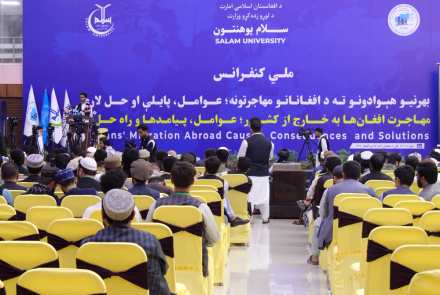A meeting titled “Afghan Migration to Foreign Countries: Causes, Consequences, and Solutions” was held in Kabul.
The head of the Afghan Red Crescent Society Shahabuddin Delawar and the head of the Contact Commission with Afghan Figures believe that educational opportunities are now available in the country, and citizens going abroad should not be considered migrants.
Delawar also emphasized that the Islamic Emirate has addressed all challenges faced by returning migrants in the country.
Shahabuddin Delawar, head of the Afghan Red Crescent Society, said: “Those Afghans who left were people for whom the Americans had prepared airplanes; there was no need for visas, passports, or tickets – they were simply told to board and leave. Hundreds of thousands were transferred. Now, even in other countries, if people are told they can go to the US directly without any requirements, they sell their homes and leave in groups. Look at the stability of the Afghan currency compared to neighboring countries’ currencies; this indicates there is no economic problem. Those who have left or are leaving Afghanistan do not have economic problems.”
Mohammad Hamed Hasib, deputy minister of finance and administration at the Ministry of Higher Education, said at the meeting: “After many difficulties, security has been established, the Islamic Emirate’s system is in place, and opportunities are available for everything; therefore, those who migrate after the Islamic Emirate’s arrival are questionable from both a principled and religious perspective.”
At the same time, private university officials stated that the purpose of the meeting was to find effective solutions to address the challenges faced by the country’s migrants.
Misbahul Haq Abdulbaqi, the head of a private university, said: “Many articles have pointed out how our compatriots living abroad are religiously, culturally, and morally influenced and affected.”
Mullah Jan Rahmani, a university professor, said: “If job opportunities are provided, water resources are managed, mines are extracted, security is further ensured, and smugglers are curbed; all these factors will help control the migration process.”
Limited access to educational and health services, forced deportations, and lack of essential documents are among the challenges Afghan migrants face abroad.

